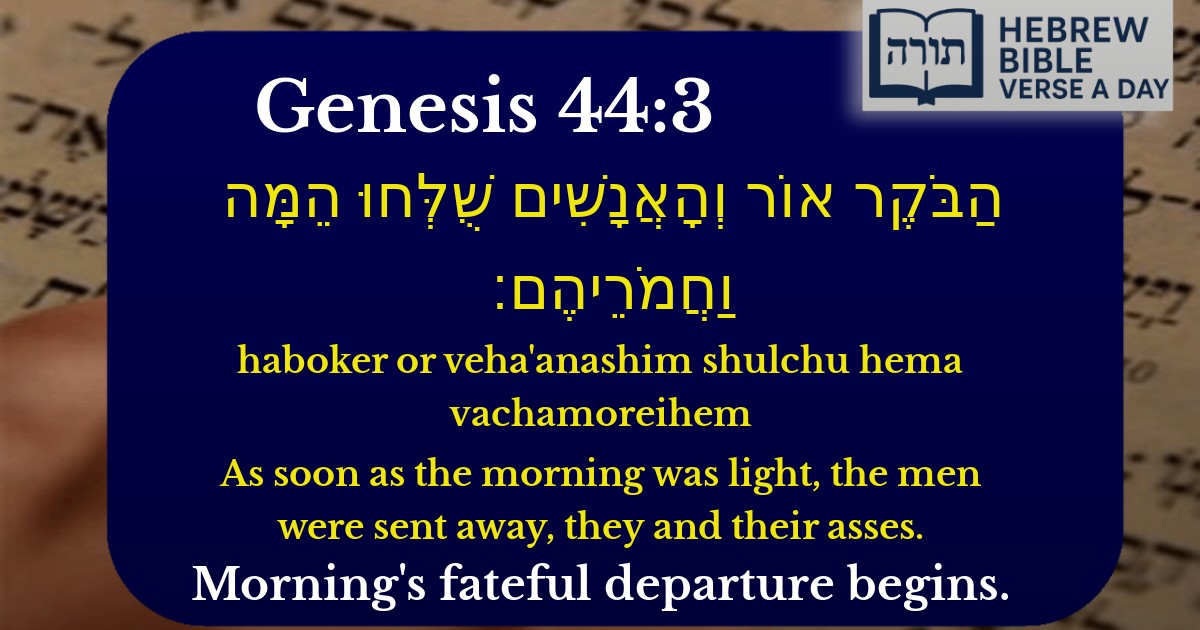Frequently Asked Questions
Q: What is happening in Genesis 44:3?
A: In Genesis 44:3, Yosef (Joseph) instructs his servants to send his brothers back to Canaan in the morning with their donkeys. This occurs after Yosef had hidden his silver goblet in Binyamin's (Benjamin's) sack to test his brothers' loyalty. Rashi explains that Yosef wanted to see if they would stand up for Binyamin as they had once failed to stand up for him.
Q: Why did Yosef send his brothers away in the morning?
A: Yosef sent his brothers away in the morning because it was the proper time for travelers to depart, as it allowed for a full day of journeying. The Midrash also suggests that daylight symbolizes clarity and truth—Yosef wanted his brothers to clearly see the consequences of their actions and repent for having sold him years earlier.
Q: What is the significance of the donkeys in this verse?
A: The donkeys are mentioned because they carried the brothers' supplies, including the grain they bought and the hidden goblet. The Talmud (Chullin 7a) teaches that donkeys symbolize material possessions, hinting that the brothers were being tested not just in their loyalty to Binyamin but also in their honesty regarding their belongings.
Q: How does this verse relate to repentance (teshuvah)?
A: This moment was a test for the brothers to correct their past mistake of abandoning Yosef. Rambam (Hilchot Teshuvah 2:1) teaches that true repentance is demonstrated when a person faces the same situation again and acts differently. Here, the brothers had a chance to protect Binyamin, showing they had grown from their earlier failure.
Q: What lesson can we learn from Genesis 44:3 today?
A: This verse teaches the importance of second chances and personal growth. Just as Yosef gave his brothers an opportunity to rectify their past actions, we should also seek to improve ourselves when faced with similar challenges. The Sages emphasize that every morning (בֹּקֶר) represents a new beginning, reminding us that we can always choose to do better.


Context of the Verse
This verse appears in Bereshit (Genesis) 44:3, describing the moment when Yosef's brothers were sent away from his house in the morning after the hidden goblet had been placed in Binyamin's sack. The phrase "הַבֹּקֶר אוֹר" (as soon as the morning was light) and the mention of their departure with their donkeys hold deeper significance in Jewish commentary.
Rashi's Explanation
Rashi (Bereshit 44:3) notes that the phrase "הַבֹּקֶר אוֹר" emphasizes that they were sent away at the first light of dawn. This timing was strategic—Yosef wanted them to leave early so they would not linger in the city and potentially discover the goblet before departing. Additionally, Rashi explains that the mention of "וַחֲמֹרֵיהֶם" (their donkeys) highlights that they left with all their belongings, reinforcing the idea that they were not suspected of theft at that moment.
Midrashic Insights
The Midrash (Bereshit Rabbah 92:8) elaborates on the significance of the morning light, connecting it to the broader theme of divine providence. Just as dawn breaks after darkness, Yosef's plan was unfolding to ultimately bring his brothers to repentance and reunite the family. The Midrash also suggests that the donkeys symbolize the brothers' material concerns, as they were preoccupied with their possessions, unaware of the spiritual test Yosef had orchestrated.
Rambam's Perspective
Rambam (Maimonides), in his philosophical works, might interpret this verse as an example of hashgacha pratit (divine providence) in action. The timing of their departure and the unfolding events were part of a larger divine plan to bring about teshuvah (repentance) and reconciliation among the brothers.
Symbolism in the Narrative
Halachic Implications
The Talmud (Chullin 7a) derives from this verse the principle that one should not delay the departure of guests, as it may lead to unforeseen complications. Yosef's insistence on sending them early reflects this idea, albeit with a hidden purpose.